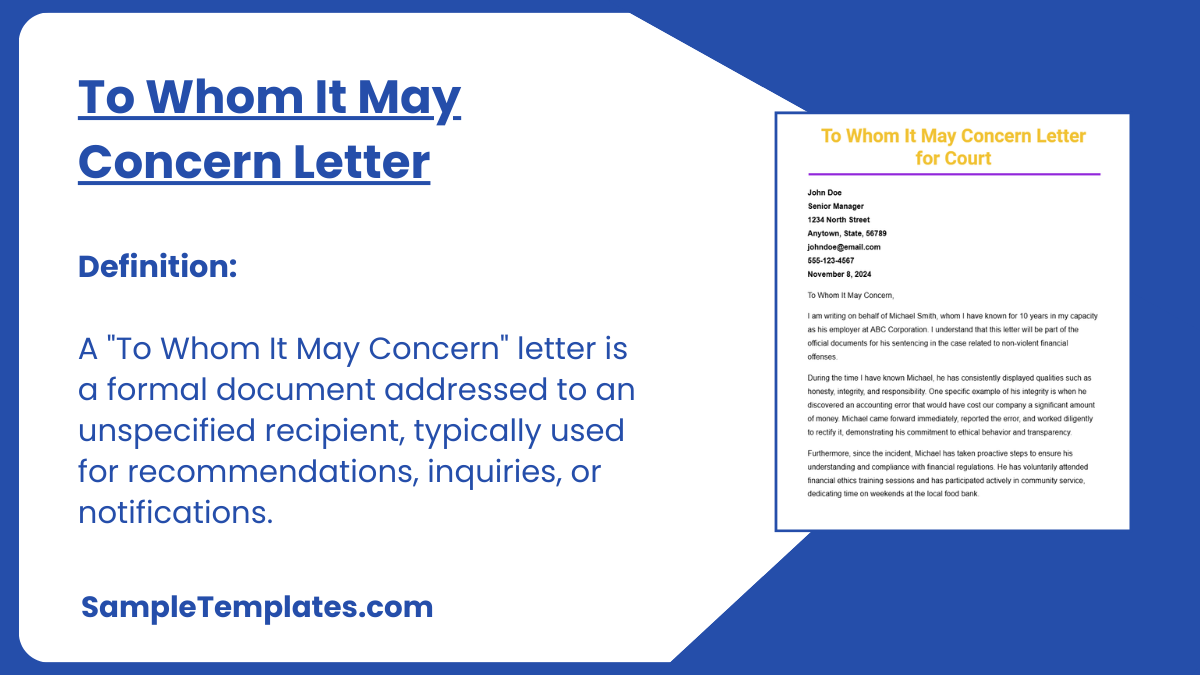Navigate the nuances of formal communication with ease using our To Whom It May Concern letter template. This comprehensive guide is your go-to resource for drafting impactful and professional letters for a variety of purposes, ranging from employment verification to personal recommendations. Meticulously designed to maintain the balance between formality and personal touch, it serves as a reliable foundation for conveying your message with clarity and precision. Ideal for both business and personal use, this template simplifies the process of creating well-structured, authoritative letters that leave a lasting impression. Embrace the art of effective communication with this essential tool, ensuring your letters stand out in any professional setting.
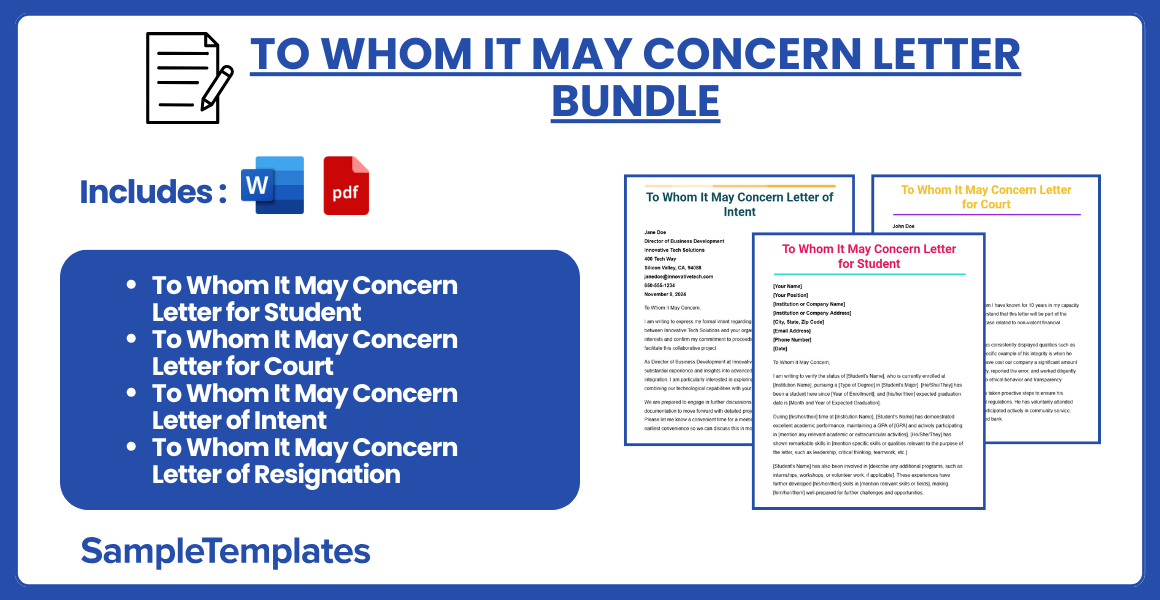
Download To Whom It May Concern Letter Bundle
To Whom It May Concern Letter for Student
[Your Name]
[Your Position]
[Institution or Company Name]
[Institution or Company Address]
[City, State, Zip Code]
[Email Address]
[Phone Number]
[Date]
To Whom It May Concern,
I am writing to verify the status of [Student’s Name], who is currently enrolled at [Institution Name], pursuing a [Type of Degree] in [Student’s Major]. [He/She/They] has been a student here since [Year of Enrollment], and [his/her/their] expected graduation date is [Month and Year of Expected Graduation].
During [his/her/their] time at [Institution Name], [Student’s Name] has demonstrated excellent academic performance, maintaining a GPA of [GPA] and actively participating in [mention any relevant academic or extracurricular activities]. [He/She/They] has shown remarkable skills in [mention specific skills or qualities relevant to the purpose of the letter, such as leadership, critical thinking, teamwork, etc.].
[Student’s Name] has also been involved in [describe any additional programs, such as internships, workshops, or volunteer work, if applicable]. These experiences have further developed [his/her/their] skills in [mention relevant skills or fields], making [him/her/them] well-prepared for further challenges and opportunities.
Please feel free to contact me at [Your Contact Information] should you require any additional information or specific details about [Student’s Name]’s performance and activities at [Institution Name].
Thank you for your attention to this matter.
Sincerely,
[Your Signature (if sending a hard copy)]
[Your Printed Name]
[Your Position]
[Department, if applicable]
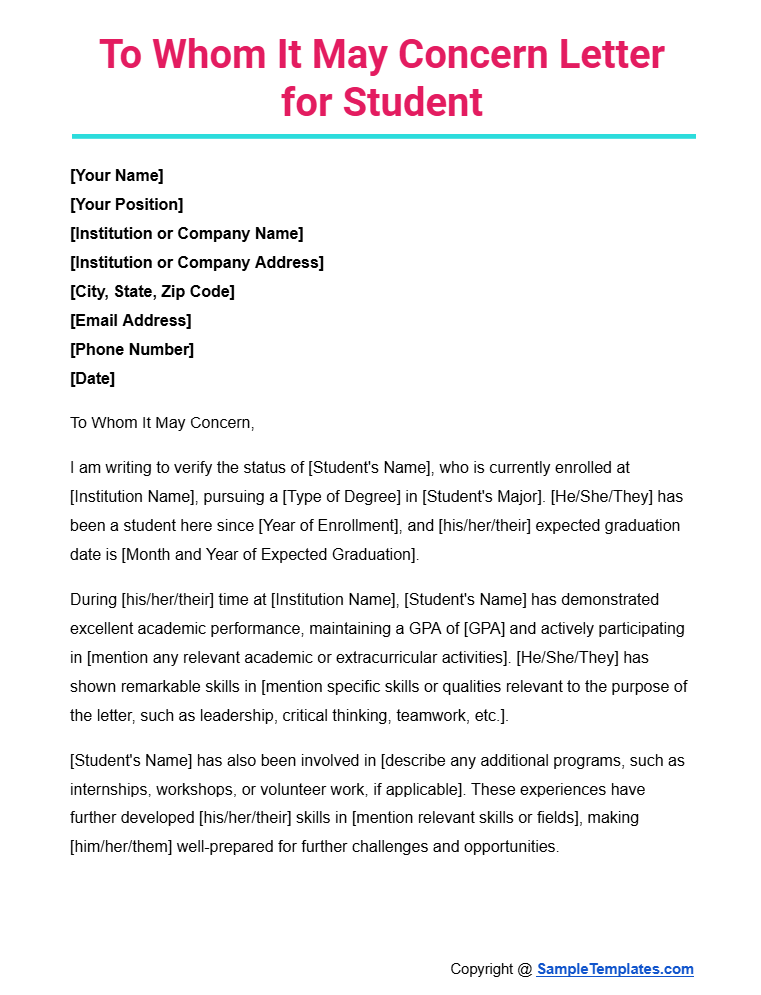
To Whom It May Concern Letter for Court
John Doe
Senior Manager
1234 North Street
Anytown, State, 56789
[email protected]
555-123-4567
November 8, 2024
To Whom It May Concern,
I am writing on behalf of Michael Smith, whom I have known for 10 years in my capacity as his employer at ABC Corporation. I understand that this letter will be part of the official documents for his sentencing in the case related to non-violent financial offenses.
During the time I have known Michael, he has consistently displayed qualities such as honesty, integrity, and responsibility. One specific example of his integrity is when he discovered an accounting error that would have cost our company a significant amount of money. Michael came forward immediately, reported the error, and worked diligently to rectify it, demonstrating his commitment to ethical behavior and transparency.
Furthermore, since the incident, Michael has taken proactive steps to ensure his understanding and compliance with financial regulations. He has voluntarily attended financial ethics training sessions and has participated actively in community service, dedicating time on weekends at the local food bank.
I believe that Michael is fundamentally a good man who made a regrettable mistake. He has shown genuine remorse and has taken meaningful steps toward personal and professional improvement.
I trust that my observations will offer helpful insights into Michael’s character and help you make a more informed decision. Please feel free to contact me at the above information should you require any further information or clarification regarding my experiences with Michael.
Thank you for considering my letter.
Sincerely,
[John Doe’s Signature (if sending a hard copy)]
John Doe
Senior Manager
ABC Corporation
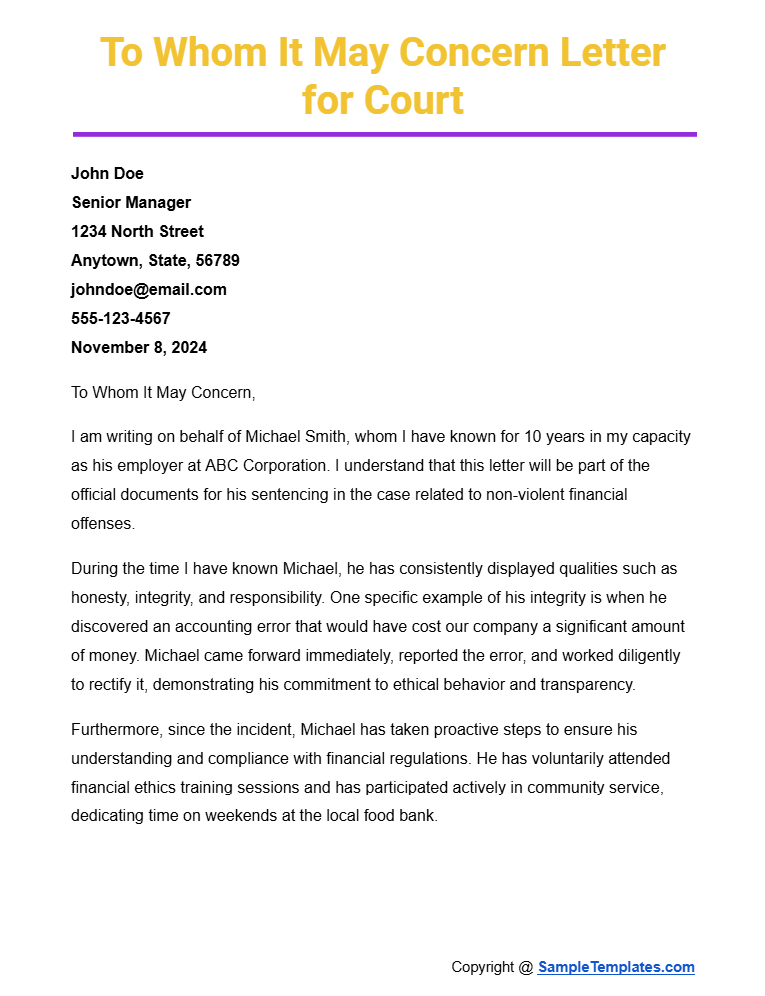
To Whom It May Concern Letter of Intent
Jane Doe
Director of Business Development
Innovative Tech Solutions
400 Tech Way
Silicon Valley, CA, 94088
[email protected]
650-555-1234
November 8, 2024
To Whom It May Concern,
I am writing to express my formal intent regarding the initiation of a strategic partnership between Innovative Tech Solutions and your organization. My aim is to outline my interests and confirm my commitment to proceeding with the necessary steps to facilitate this collaborative project.
As Director of Business Development at Innovative Tech Solutions, I have gained substantial experience and insights into advanced tech development and market integration. I am particularly interested in exploring joint ventures that focus on combining our technological capabilities with your extensive distribution networks.
We are prepared to engage in further discussions and provide any necessary documentation to move forward with detailed project planning and resource allocation. Please let me know a convenient time for a meeting, or feel free to contact me at your earliest convenience so we can discuss this in more detail.
Thank you for considering my intent. I look forward to the opportunity to work together and am excited about the prospects that our joint efforts may bring.
Sincerely,
[Jane Doe’s Signature (if sending a hard copy)]
Jane Doe
Director of Business Development
Innovative Tech Solutions
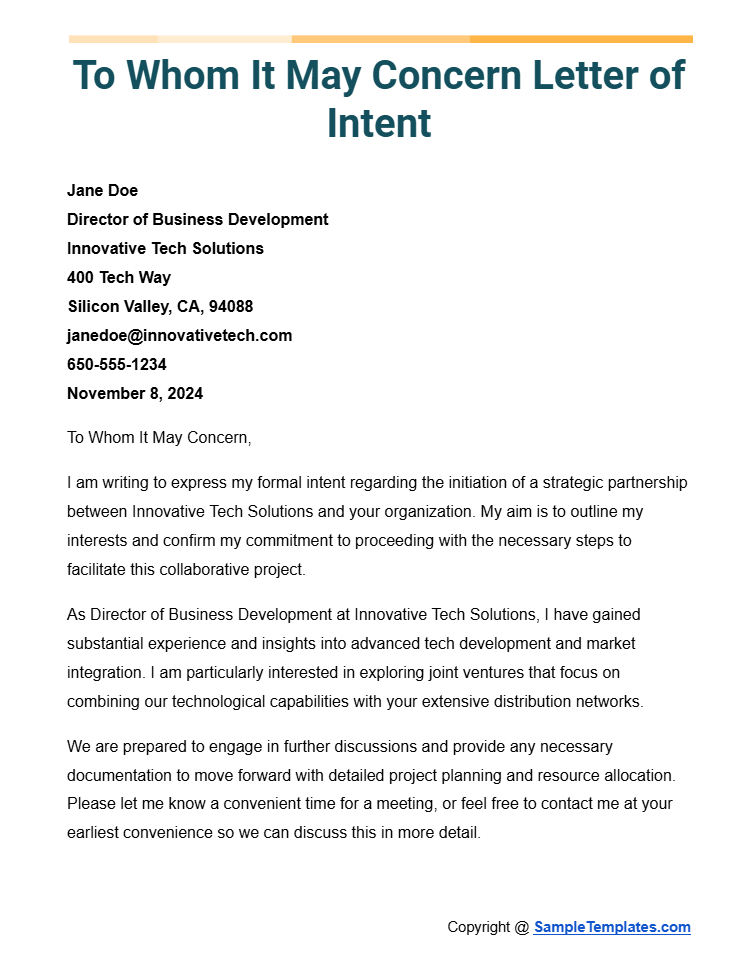
To Whom It May Concern Letter of Resignation
Sarah Thompson
Senior Graphic Designer
Creative Designs Inc.
255 Design Lane
New York, NY, 10001
[email protected]
555-890-1234
November 8, 2024
To Whom It May Concern,
I am writing to formally announce my resignation from my position as Senior Graphic Designer with Creative Designs Inc., effective November 22, 2024.
This decision has not been easy and took careful consideration. However, after evaluating my career goals and personal aspirations, I have decided to pursue other opportunities that align more closely with my long-term career objectives.
I want to express my gratitude for the opportunities I have been given at Creative Designs Inc., the professional guidance, and the valuable experiences I have gained over the years. It has been a genuine pleasure working with such a talented team and contributing to the company’s missions and goals.
During the remaining two weeks, I am committed to completing my current projects and ensuring a smooth transition of my responsibilities. I am happy to assist in training my replacement and will ensure that all my tasks are up to date before my departure.
Please let me know how I can help during this transition period. I hope to maintain our professional relationships and look forward to how our paths may cross in the future.
Thank you again for the opportunity to be a part of Creative Designs Inc. I am looking forward to my new position and the new challenges that await, but I will always look back on my time here with fondness and appreciation.
Sincerely,
[Sarah Thompson’s Signature (if sending a hard copy)]
Sarah Thompson
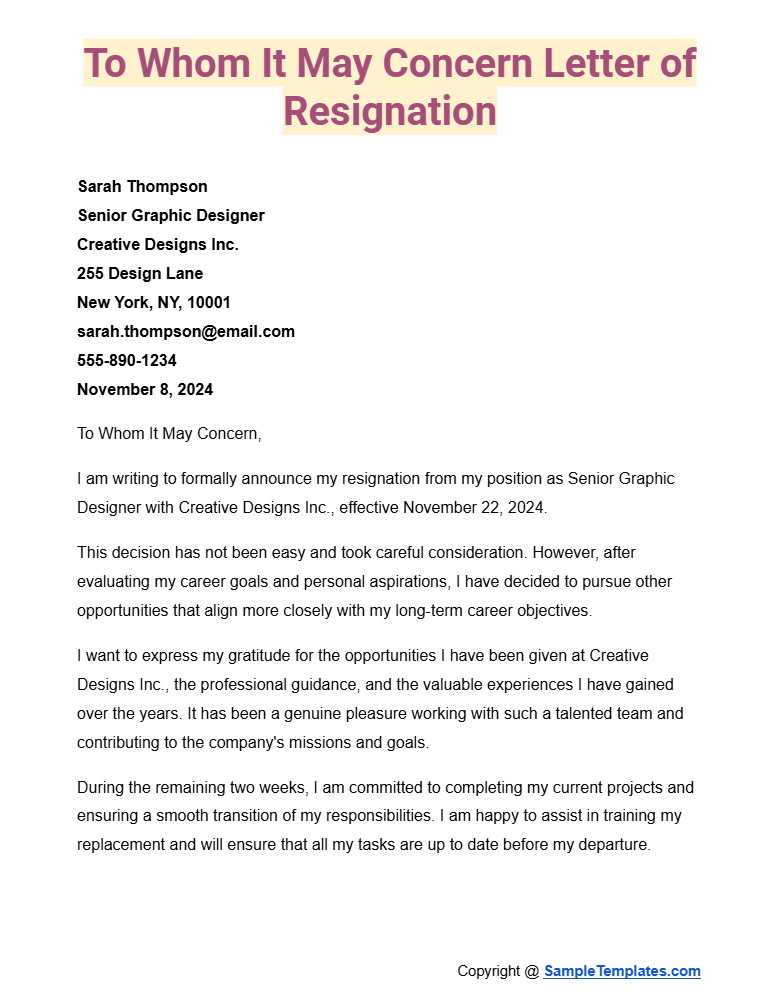
Browse More Templates On To Whom It May Concern Letter
1. Sample To Whom It May Concern Letter
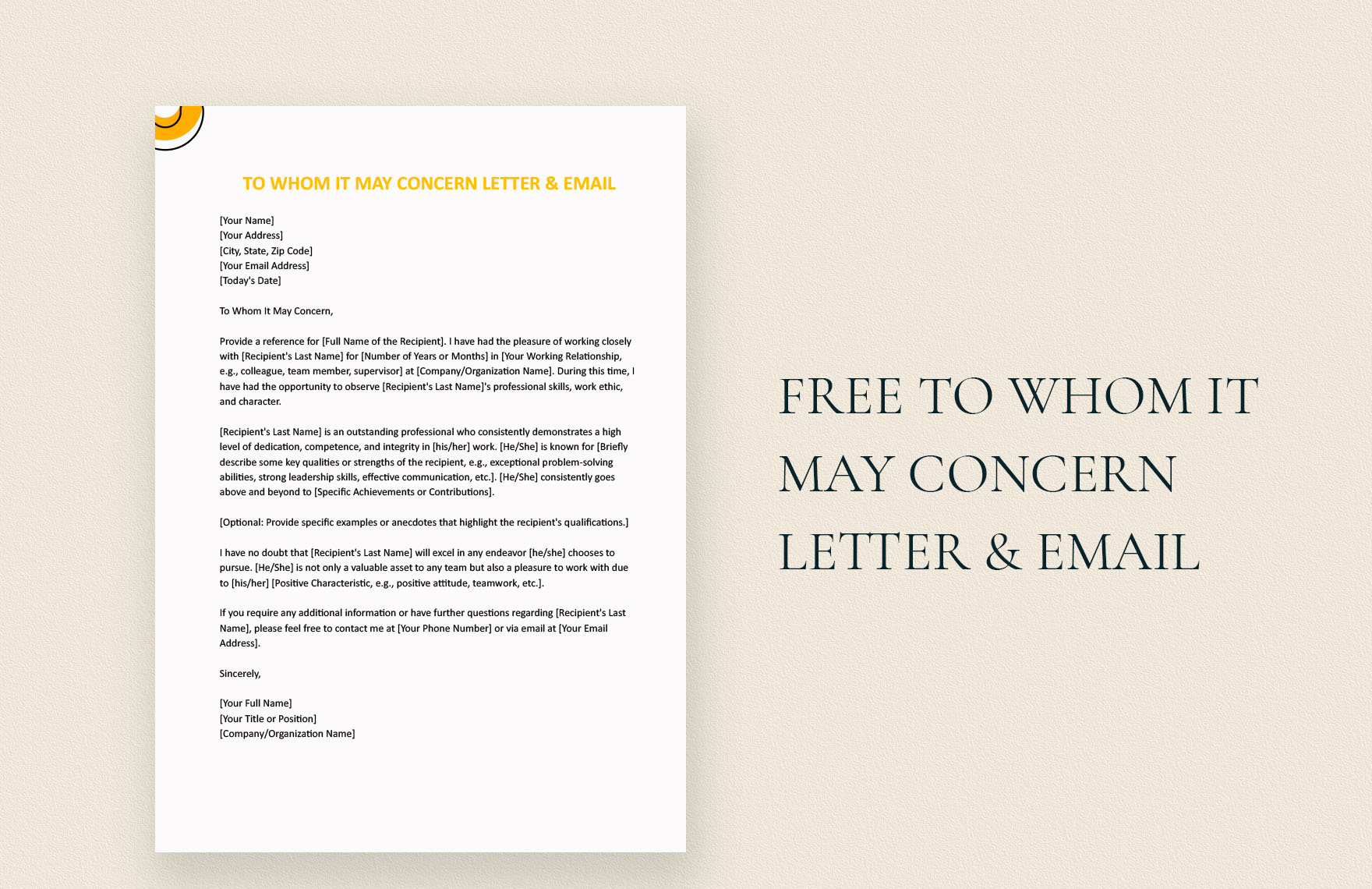
2. Verification To Whom It May Concern Letter Template
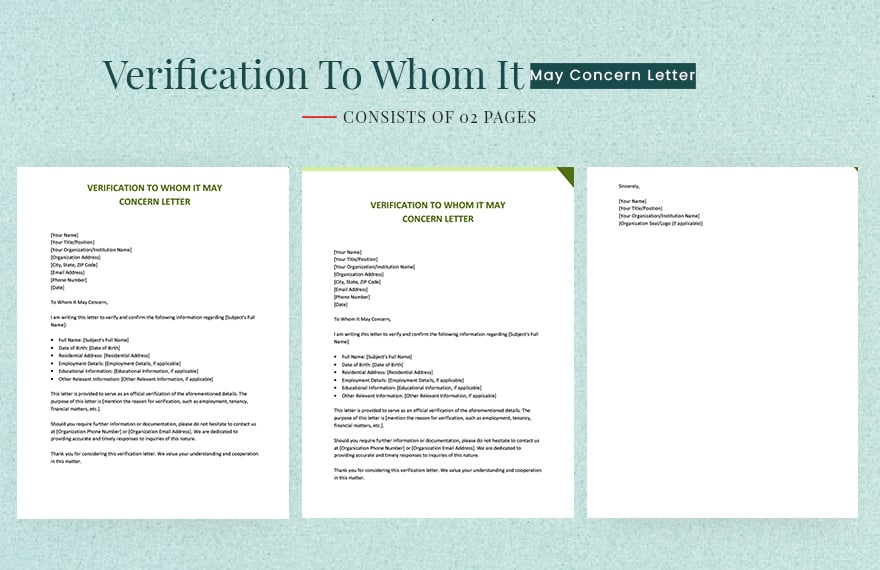
3. To Whom It May Concern Letter Template
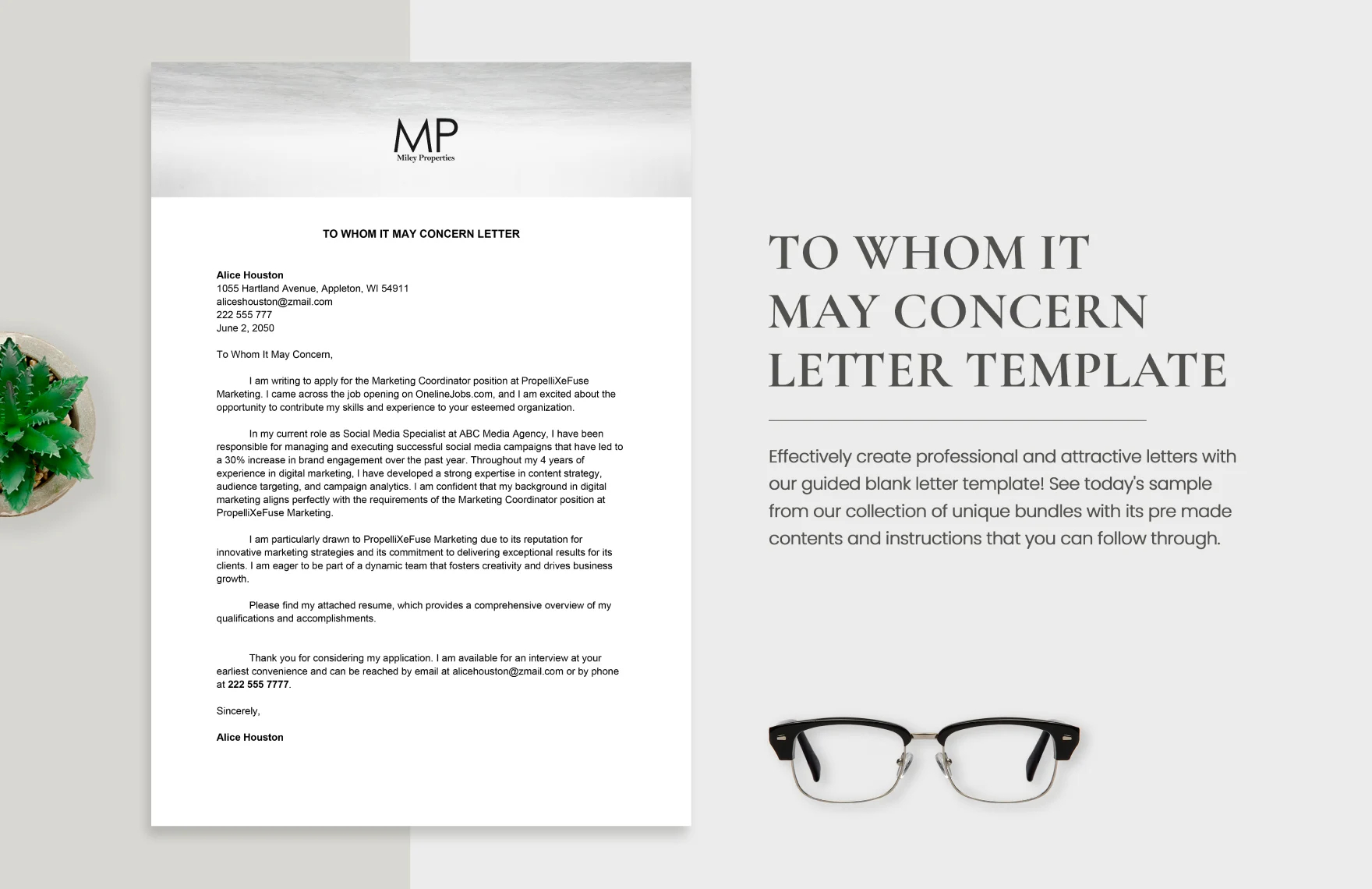
Understanding “To Whom It May Concern”
To Whom It May Concern is a timeless and formal salutation used in various types of professional correspondence. This guide will delve into when and how to use this phrase effectively, ensuring your communications are appropriately addressed.
The Correct Usage of This Salutation
Primarily, “To Whom It May Concern” is employed in scenarios where the recipient’s name is unknown. It’s a universally accepted phrase suitable for several contexts, including job applications, recommendation letters, formal complaints, and general inquiries.
Writing the Salutation “To Whom It May Concern”
Formatting Rules
When using “To Whom It May Concern,” it’s crucial to follow standard formatting rules. The entire phrase should be capitalized and followed by a colon. For example: “To Whom It May Concern:”
Placement in Correspondence
This salutation is positioned at the top of the letter, just below the sender’s contact information and the date. It precedes the body of the letter and is aligned to the left margin.
Contextual Application
Use To Whom It May Concern only when you cannot identify the recipient’s name through research. In today’s digital age, a little research often yields the necessary contact information, making this phrase more of a last resort.
Alternatives to “To Whom It May Concern”
Job Title-Based Salutations
If the recipient’s job title is known, addressing them by their role is a more personalized approach. For example, “Dear Hiring Manager,” or “Dear Customer Service Manager,” can be effective.
Other Formal Alternatives
In situations where personalization is not feasible, alternatives like “Dear Sir/Madam,” or “Dear [Department Name] Team,” can be used. These provide a touch of specificity while maintaining a formal tone.
Crafting a Letter with “To Whom It May Concern”
Structure of the Letter
Start with a concise introduction stating the letter’s purpose. The main body should contain the letter’s primary message or request, and the conclusion should summarize the key points with a polite closing remark.
Tips for Effective Communication
Ensure the letter maintains a professional tone throughout. Be clear and concise in your wording, and always proofread the letter for errors before sending.
To Whom It May Concern remains a useful tool in formal communication, particularly when the recipient’s identity is unknown. However, in an era where information is readily available, taking the extra step to personalize your correspondence can make a significant difference in how your message is received. When in doubt, this salutation serves as a respectful and professional way to address your letter.
4. Sample To Whom It May Concern Cover Letter
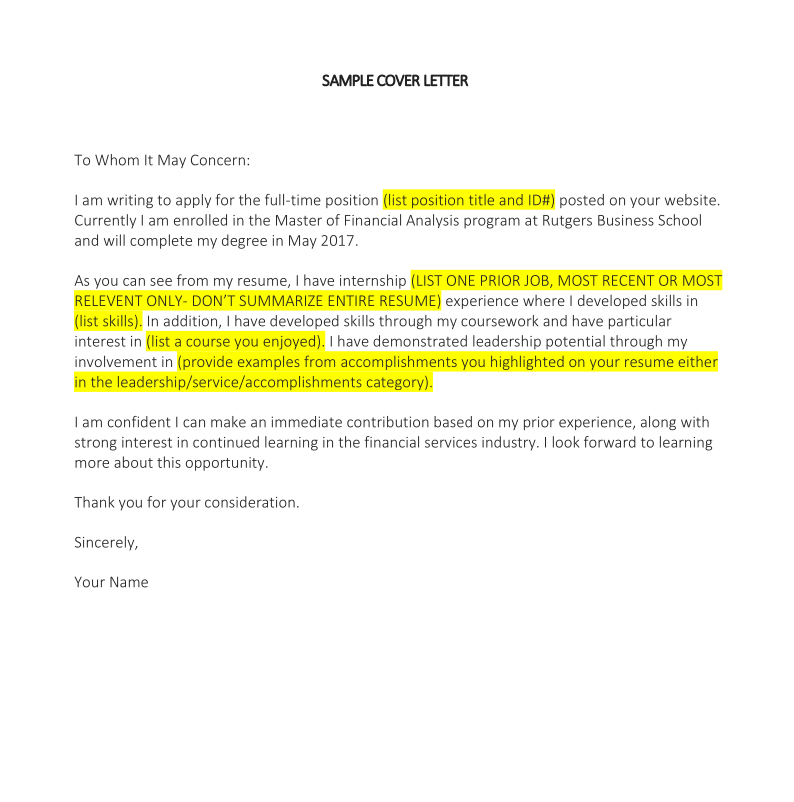
Steps to Write a “To Whom It May Concern Letter”?

- Start with a Proper Layout: Begin with your name and contact information at the top of the letter, followed by the date. Since you are using a general salutation, skip the recipient’s address and start directly with “To Whom It May Concern:” positioned as the greeting. Ensure this salutation is followed by a colon.
- Open with a Clear Purpose: In the first paragraph, clearly state why you are writing the letter. Be concise and to the point. This could be for a variety of reasons such as a reference, resignation, or a general inquiry.
- Include Detailed Content: In the body of the letter, provide all the necessary details related to your purpose. If it’s a recommendation, include how you know the person and why you are qualified to recommend them. If it’s a resignation, detail your reasons for leaving and your last working day. You can also see more on Addressing a Formal Letter.
- Maintain a Formal and Respectful Tone: The tone of the letter should be professional and courteous throughout, regardless of the content. Avoid slang and make sure your grammar and spelling are correct to convey respect and seriousness.
- Close Formally: Conclude your letter by reiterating any actions needed, thanking the reader for their time, or offering to provide further information. Use a formal closure like “Sincerely” or “Respectfully,” leave space for your signature, and then type your full name. If you are sending an email, you can include your electronic signature or typed name along with your contact information. You can also see more on Official Letter.
5. Sample Residence To Whom It May Concern Letter
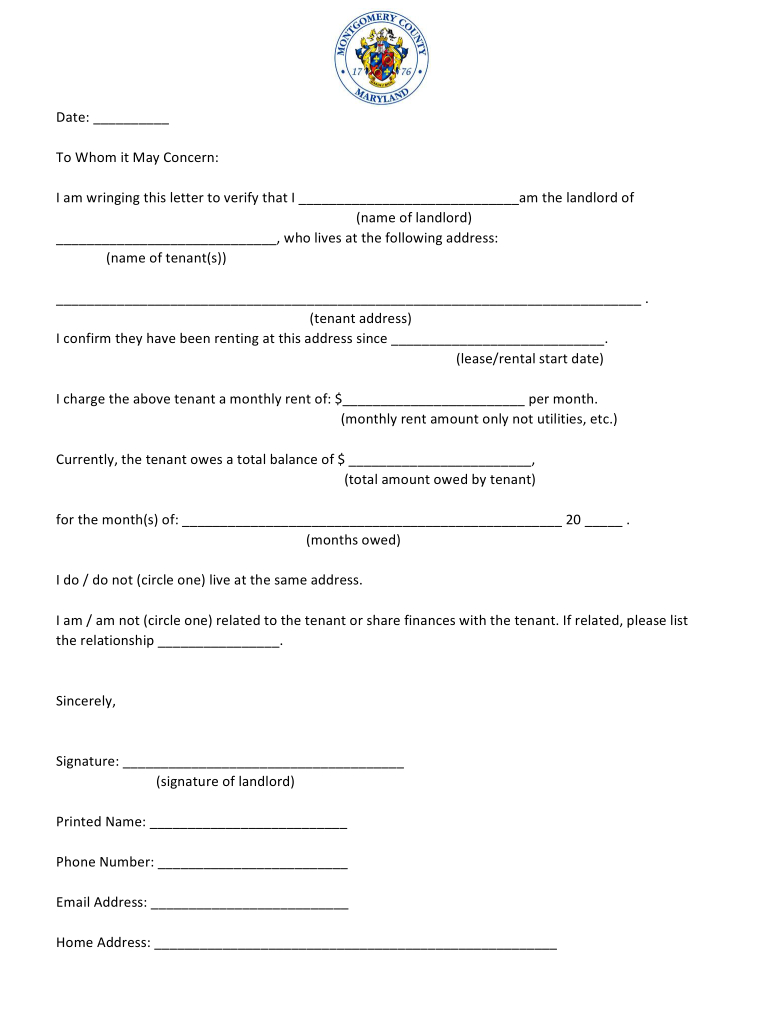
6. Sample To Whom It May Concern Recommendation Letter
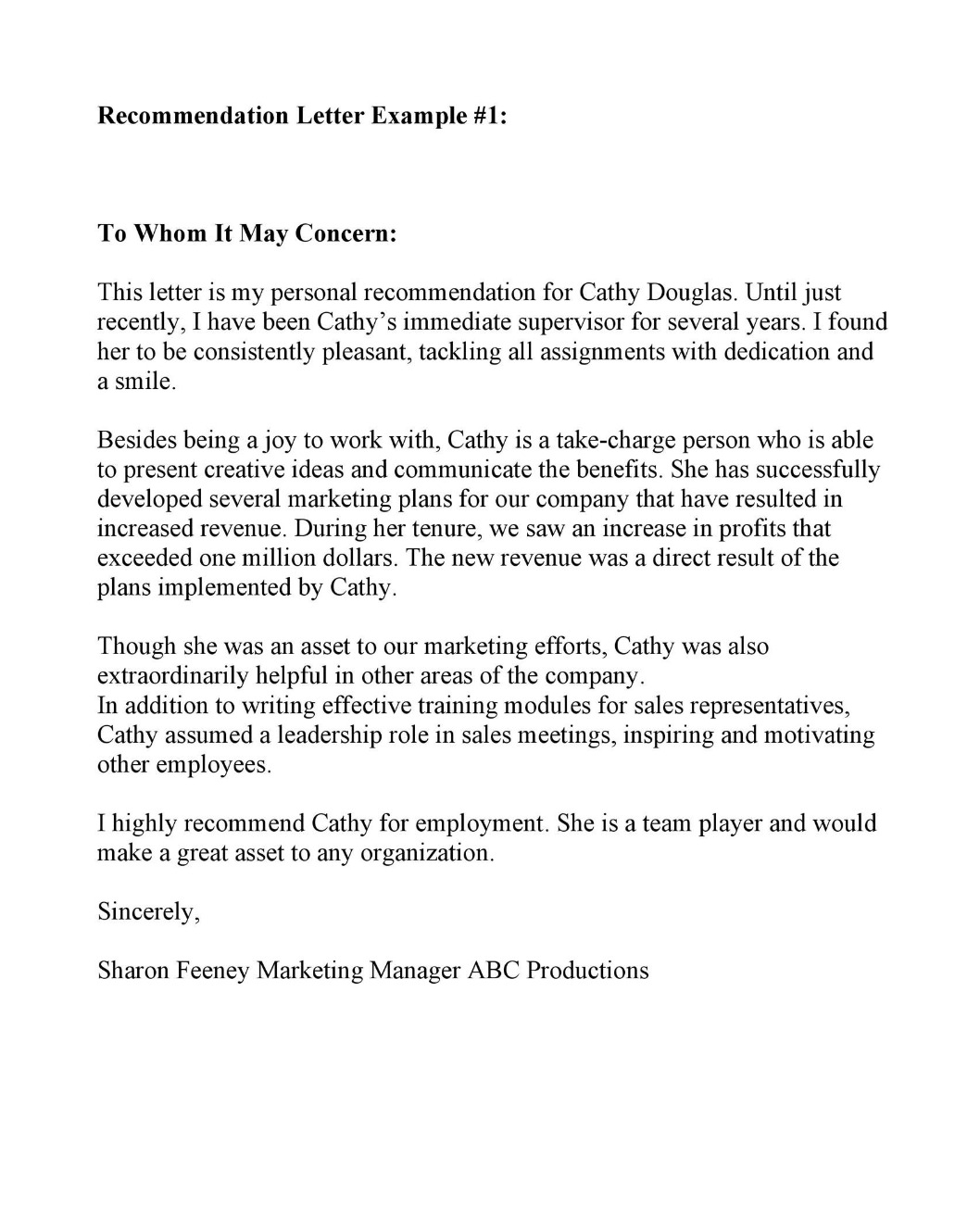
Evaluating the Correctness of “To Whom It May Concern”
The phrase “To Whom It May Concern” has long been a staple in formal correspondence, especially in situations where the identity of the recipient is unknown. This discussion explores the correctness and relevance of this phrase in modern professional communication.
Historical and Contemporary Use
Originating in a time when business communications were more formal and less personalized, “To Whom It May Concern” served as a one-size-fits-all salutation. However, in today’s fast-paced, information-rich world, the use of this phrase can sometimes be perceived as outdated or impersonal. It often indicates either a lack of effort to identify the recipient or a very broad target audience for the message.
Appropriate Contexts for Usage
- General Inquiries: When sending a letter to an organization without a specific point of contact, “To Whom It May Concern” is appropriate.
- Formal Complaints: In instances where a complaint is addressed to an organization rather than an individual.
- Recommendation Letters: When a letter of recommendation is intended to be used for multiple applications or opportunities.
- Legal and Official Documents: Where specific recipient details are not known.
Modern Communication Trends
The digital age has transformed how we approach professional communication. With the abundance of resources available online, finding the name of the intended recipient is often possible through a simple search. Consequently, personalized salutations are increasingly favored as they demonstrate attentiveness and professionalism.
Pros and Cons of Using This Salutation
Pros:
- Universality: It is widely recognized and understood in formal contexts.
- Suitability for Broad Audiences: Ideal when the letter is intended for multiple potential readers.
Cons:
- Impersonal: Can convey a lack of effort to personalize the correspondence.
- Outdated: May seem archaic in the context of modern, tailored communication strategies.
Alternatives to “To Whom It May Concern” - Using Job Titles: Addressing the letter to a specific job title (e.g., Dear Hiring Manager) can be more direct while still being formal.
- Generic but Personalized Salutations: Phrases like Dear Sir or Madam or Dear [Company/Department Name] Team are alternatives that can feel more current and personal.
While To Whom It May Concern remains a grammatically and formally correct salutation, its appropriateness largely depends on the context and nature of the correspondence. In today’s professional world, where personalization is often key to effective communication, considering alternatives or making an effort to find out the recipient’s name can be more impactful. However, in situations where such personalization is not feasible, To Whom It May Concern serves as a reliable and professional option. The key is to weigh the nature of your message and the relationship with the recipient to decide the most suitable approach.
7. College To Whom It May Concern Letter Template
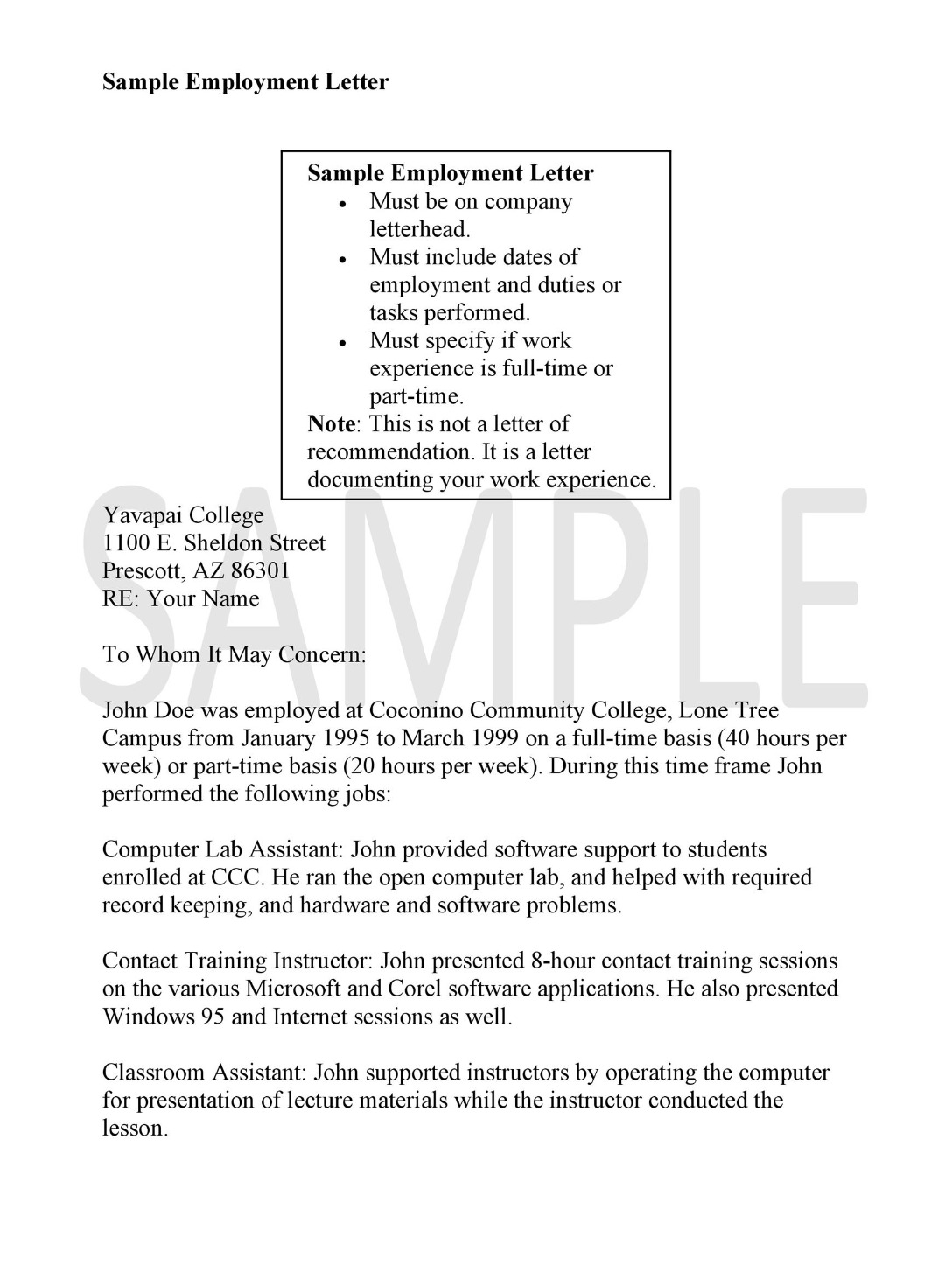
8. Employee To Whom It May Concern Letter Template
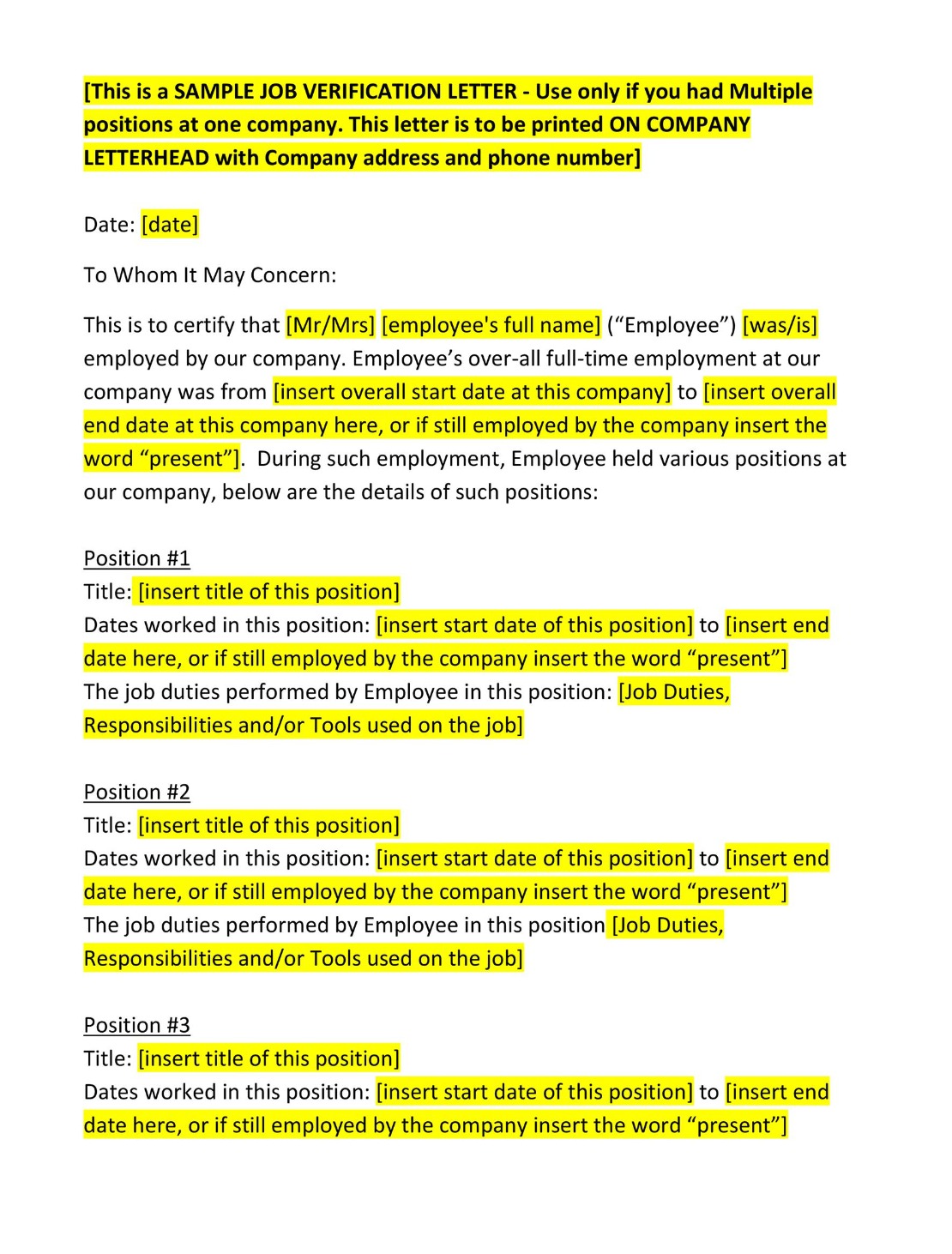
Exploring the Meaning of “To Whom It May Concern”
The phrase “To Whom It May Concern” is a time-honored salutation used in formal letters and correspondence. Understanding its meaning, usage, and the contexts in which it is appropriate is essential for effective communication in various professional settings.
The Essence of the Phrase
To Whom It May Concern is a formal, impersonal way of addressing correspondence to an unknown party. It essentially means that the message is intended for the person (or persons) whose role or position makes them the appropriate recipient of the communication. You can also see more on Cover Letter Salutations.
Historical Context and Usage
This phrase has its roots in traditional business etiquette, where formalities were strictly adhered to, and personalization was less emphasized. Historically, it served as a catch-all salutation for various types of formal letters, especially in cases where the sender did not know who would be reading the letter.
Contemporary Relevance
In the modern world, the phrase is used less frequently due to the ease of obtaining contact information through digital means. However, it retains its relevance in certain situations:
- Unknown Recipients: When writing to a large organization or department where the specific recipient is not known.
- Formal Documents: In legal, official, or formal documents where a specific addressee is not applicable.
- Letters of Recommendation: For documents that may be presented to various potential readers, such as general letters of recommendation.
- Public Notices or Announcements: In communications intended for a broad audience where individual addressing is not possible.
The Implications of Using the Phrase
While “To Whom It May Concern” is grammatically correct and widely recognized, it carries certain implications:
- Impersonality: It can imply a lack of effort to identify the specific recipient, which might not be well-received in contexts where personalization is possible and expected.
- Formality: The phrase is inherently formal and should be used in contexts that require a high degree of professionalism.
- Versatility: It is suitable for various types of formal correspondence, making it a versatile tool in a professional toolkit. You can also see more on Requisition Letter.
Modern Alternatives and Best Practices
Given the emphasis on personalized communication in today’s professional world, here are some alternatives:
- Direct Addressing: Whenever possible, address the recipient by name or title.
- General but Personal Salutations: Phrases like Dear Hiring Manager, Dear Sir or Madam, or Dear [Department] Team can offer a balance between formality and personalization.
To Whom It May Concern remains a valuable phrase in the lexicon of formal communication, particularly suited to situations where the recipient is unknown or the message is intended for a broad audience. However, its use should be balanced with the contemporary preference for personalized communication, ensuring that correspondence is as effective and professionally appropriate as possible.
9. Sample To Whom It May Concern Application Letter
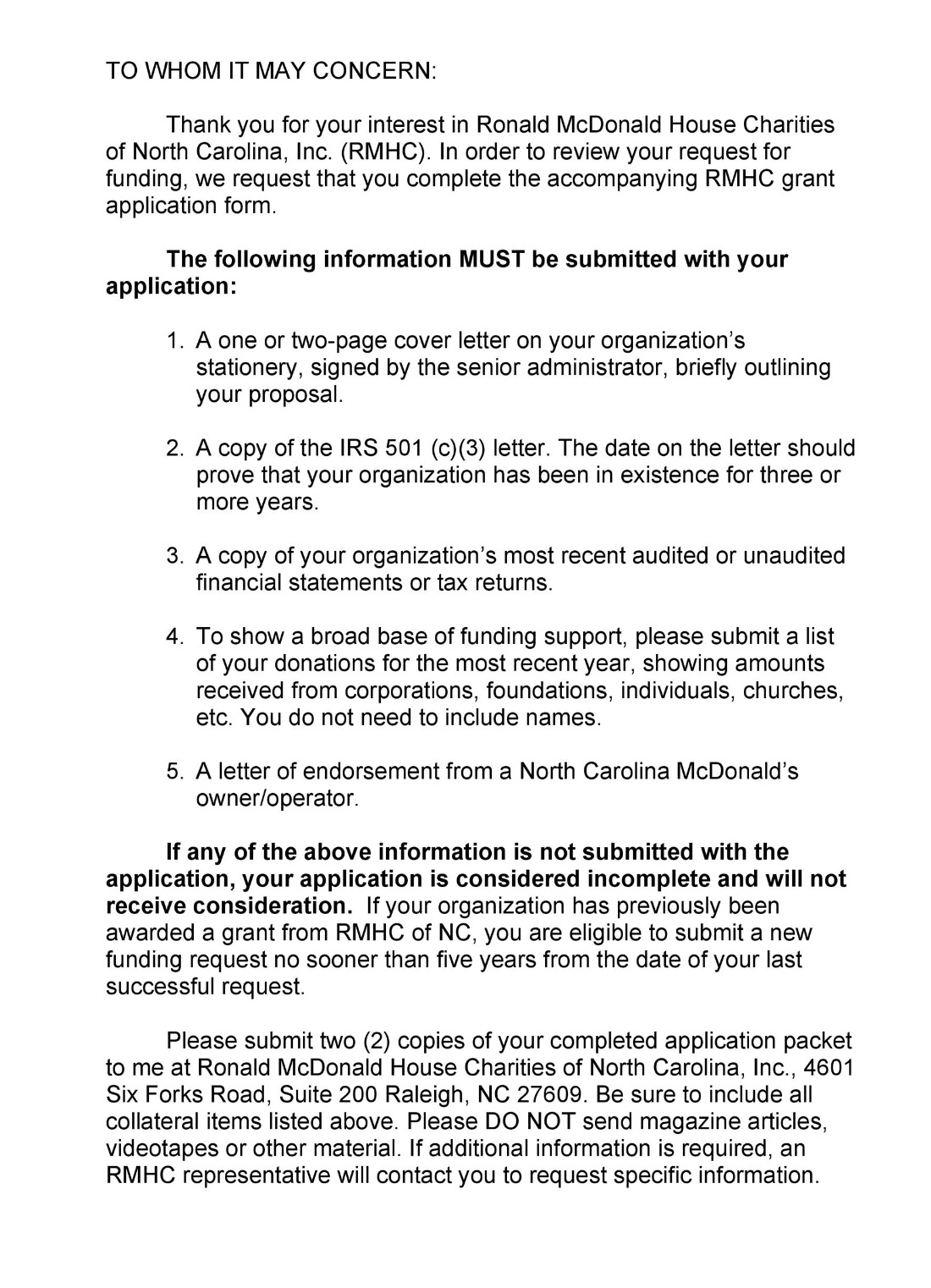
10. Sample To Whom It May Concern Invitation Letter
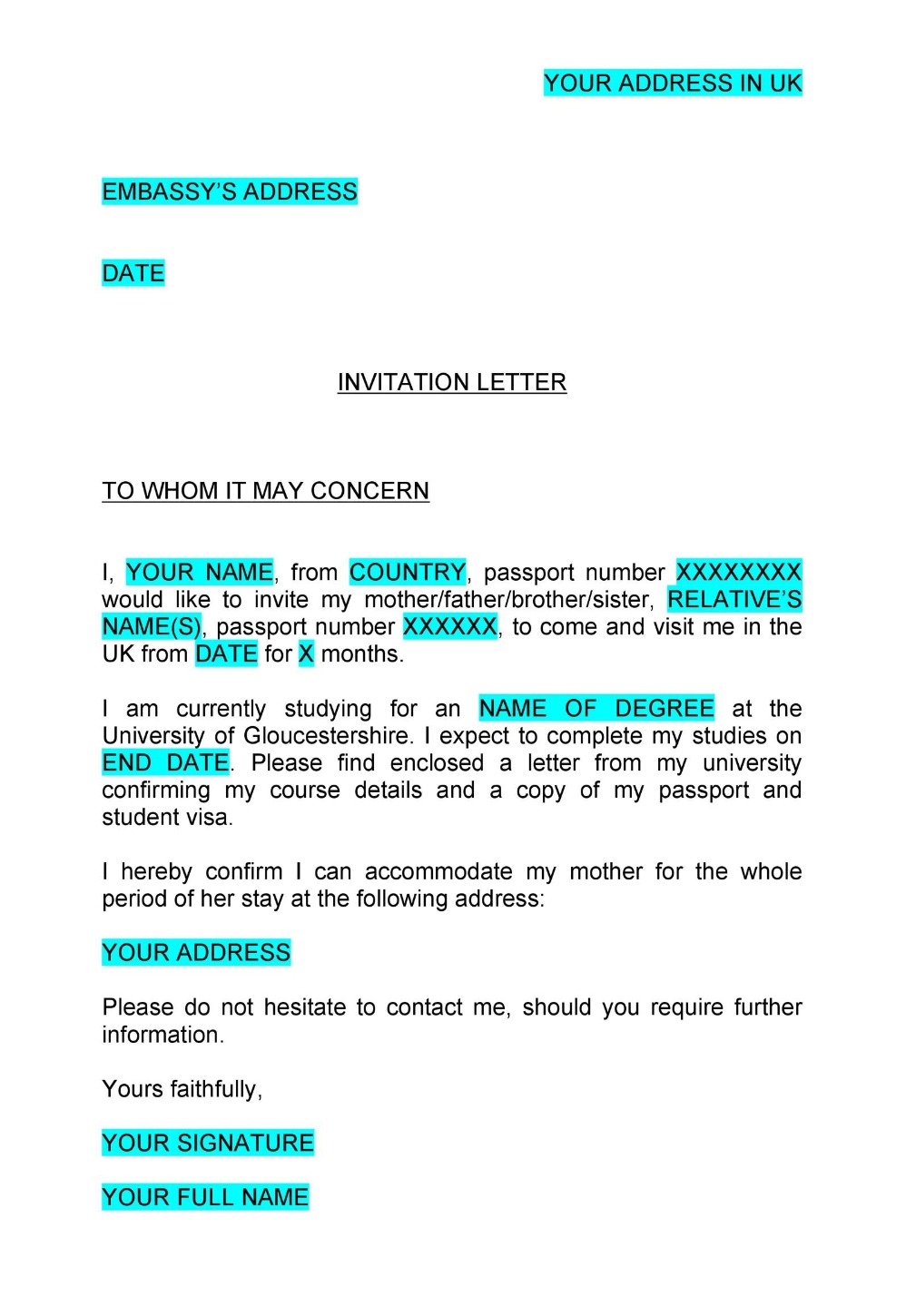
11. To Whom It May Concern Authorization Letter Template
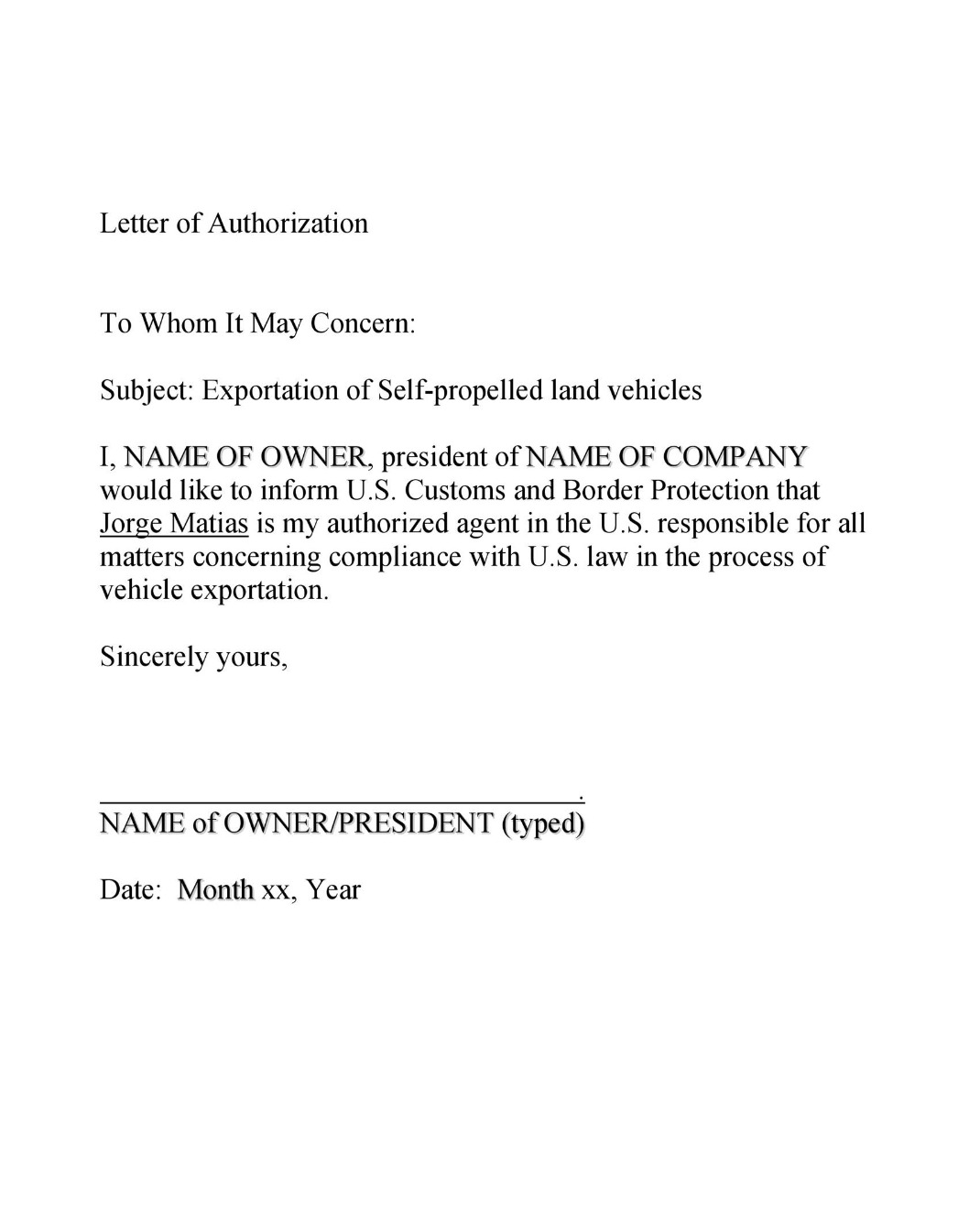
What is a “To Whom It May Concern” letter?
A “To Whom It May Concern” letter is a formal type of correspondence used when the sender does not know the name of the recipient. It’s a traditional way to address letters in business, legal, and other formal settings.
When should I use “To Whom It May Concern”?
You should use “To Whom It May Concern” when you are writing a formal letter and do not know the specific name of the recipient. This is common in situations like job applications, recommendation letters, and formal inquiries.
Is “To Whom It May Concern” still appropriate to use?
Yes, “To Whom It May Concern” is still appropriate in formal contexts where the recipient’s name is unknown. However, it’s advisable to try and find out the specific name for a more personalized approach.
How do I format a “To Whom It May Concern” letter?
The phrase “To Whom It May Concern” should be capitalized and followed by a colon. It should be placed at the top of your letter, aligned to the left, and followed by the body of your letter.
Can I use “To Whom It May Concern” for an email?
Yes, you can use this salutation for formal emails when the recipient’s name is unknown. However, emails often allow for a bit more flexibility, so consider if a less formal alternative might be more suitable.
Related Posts
Letter of Intent for a Job Samples & Templates
Lease Proposal Letter Samples & Templates
Letter of Inquiry Samples & Templates
Character Reference Letter Samples & Templates
Claims Letter Samples & Templates
Response Letter Sample & Templates
Follow Up Letter Samples & Templates
Sample Project Proposal Letter Templates
Donation Letter Samples & Templates
Addressing a Formal Letter Samples & Templates
Grievance Letter Samples & Templates
Sample Sponsor Thank You Letter Templates
Sample Letters of Request
Sample Cover Letter for Teacher
Acceptance Letter Samples & Templates
